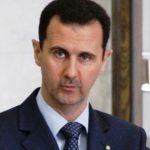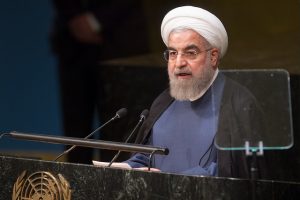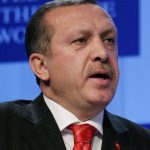President Barack Obama entered office with a promise to avoid “stupid wars.” Through that phrase, he conveyed his resolve to the world about not starting another war a la George W. Bush in Iraq in 2003. As Obama enters the twilight of his presidency, it is necessary to remember that the Obama doctrine — “Don’t do stupid s—t” — has kept this country out of a war in Syria, a place that continues to dare all major powers to jump in at their own peril.

Barack Obama >Flickr/Joe Crimmings
President Vladimir Putin of Russia has jumped in that quagmire with his eyes wide open, as did Iran. Sunni Arab countries — Saudi Arabia, the United Arab Emirates and Qatar — adroitly decided not to send in ground troops. Instead, they are supporting Islamist groups whose ideological commitment to moderate Islam remains as temporary as that region’s sand dunes. No one really knows how many of them actually support the al-Qaida-affiliated Jabhat al-Nusra or Daesh (ISIS/ISIL/IS). These Arab states are fully aware that, if their preferred Islamist groups were to succeed in defeating Daesh — an unlikely outcome — the result would be a post-Assad Syria where another Islamist government would take control. Given the bloody history of all countries where Islamist groups have had any palpable political power or visibility, no one wants to see the emergence of an Islamist Syria after Bashar Assad. Thus, Obama’s decision not to commit American ground troops in that country will long be remembered for keeping the mightiest military power out of another Middle Eastern quagmire.
But what is the future of Syria and how can or should the continuing conflict there be resolved? No one has any clue at this point, even though the United States has not suspended efforts to find a political solution. The challenge is that, first, there is no chance of ending the conflict without eradicating, or at least considerably weakening, Daesh as a fighting force and dismantling its so-called caliphate. For Daesh, the end of that war means either the implosion of the Assad regime or its own destruction as a fighting force. So, a political solution that involves Daesh is not even an option here.
The second problematic, and equally intricate, aspect of the Syrian conflict is that neither Russia nor Iran want to consider any political solution that would end their presence and sphere of influence in Syria.
Russia

Vladimir Putin >Flickr/Global Panorama
After being ousted from Egypt just before the Ramadan/Yom Kippur/October War of 1973 by then-President Anwar Sadat, the Soviet Union did not have much of a presence in the Middle East except in Syria. President Hafez al-Assad, Bashar’s father, agreed to open a Soviet naval base in Tartus in 1971. In 1980, the USSR and Syria signed the Treaty of Friendship and Cooperation, which became the basis for collaboration between the two countries, including military cooperation and consultation during crises. After the implosion of the Soviet Union in 1991, Syria recognized Russia in 1992 as the legal heir to the USSR, thereby reviving the treaty, which is still in force today.
The USSR and its successor state, Russia, watched with considerable envy the escalating strategic presence and influence of the United States as a result of Secretary of State Henry Kissinger’s shuttle diplomacy after the 1973 war. It was only during the presidency of Putin, when Russia wanted to recapture the loss of its global strategic presence and influence, that it started to assert itself in the Middle East. The best opportunity came at the onset of the civil war in Syria in March 2011, which itself was due to the spillover effects of the Arab Awakening. In 2011 and 2012, Russia used its veto power at the U.N. Security Council to prevent sanctions and military intervention that a number of Arab and Western countries wanted to take against Assad’s regime. Russia also remained one of the main suppliers of arms to Syria.

Bashar Assad >Flickr/Freedom House
It was at Putin’s urging that Assad agreed to dispose of Syria’s chemical weapons arsenal, thereby saving Syria from possible American military action on that front. Obama had declared that he would take military action against the Assad regime if Assad used chemical weapons against his people. However, the war-weary Obama was clearly driven by his doctrine of don’t do stupid stuff, and his palpable reluctance to take even “limited” military action against the Assad regime provided a huge opening for Russia to enter the conflict by escalating its military defense of the regime. Putin audaciously exploited that opening; on September 30, 2015, Russian air strikes hit militant groups that were opposed to Assad’s government but were supported by the United States, Saudi Arabia and the UAE.
Russia’s entry not only became a source of digression from the American and Arab countries’ objective of weakening and destroying Daesh and its so-called caliphate, but it also enhanced the longevity of the Assad regime. This has prompted all the Republican presidential candidates to deride the Obama doctrine.
Iran

Iranian President Hassan Rouhani >Flickr/United Nations Photo
Iran is another crucial supporter of the Assad regime. It has not only been an important source of financial and military assistance, but its various militias — Asa’ib Ahl al-Haq (AAH) and Kata’ib Hezbollah (KH) — and its Quds force also remain significant players in the Syrian conflict. The AAH originally split from Muqtada al-Sadr’s Jaysh al-Mahdi (JAM) in 2006; and it, along with KH, is ultimately responsible to Major General Qassem Soleimani, who heads the Iranian Revolutionary Guards Corps’ Quds Force (IRCG-QF). Lebanon’s Hezbollah has also been a major pro-Iranian military actor in Syria.
From Iran’s perspective, the Iraqi and Syrian theaters of operation are one and the same, since Iran is supporting the survival of Shia governments in both countries. Iran’s presence and influence in Iraq remains unchallenged. However, if the Assad regime were to fall, this would likely jeopardize Iran’s presence and influence not only in Syria, but also in Lebanon. Still, Iran may be open to a political resolution of Syria’s conflict if its strategic interests in the Levant (mostly in Syria and Lebanon) are safeguarded in a post-Assad Syria. For at least the remainder of Obama’s term in office, the United States would be open to such a resolution.
Looking to the Future
Despite the slight advantages that Russia and Iran enjoy in Syria, the ultimate significance of the United States stems from the fact that it remains the only actor that can bring about a negotiated solution to that conflict. U.S.-backed Kurdish peshmergas appear to be turning the tide of war in Iraq against Daesh, with the U.S. Air Force playing a decisive role in their success.

Turkish President Recep Tayyip Erdogan >Flickr/Global Panorama
Turkey, another American ally and a major player in the Syrian conflict, is rethinking its previous indecisiveness about adopting a firm stance against Daesh, particularly by significantly controlling the cross-border movement of pro-Daesh terrorists between Syria and Turkey. If earnestly applied, this measure alone is likely to palpably reduce the number of volunteers in Daesh’s fighting force.

Saudi King Salman >Flickr/Tribes of the World
Since Russia and Iran are willing to negotiate the future of Syria with the United States and its Arab allies, there are discernable chances that a political solution might be reached on that issue. Even Saudi Arabia has declared its intention to remain at the negotiating table, despite the fact that it has exacerbated its conflict with Iran with its impetuous decision to kill anti-Saudi Shia cleric Sheikh Nimr al-Nimr. Still, Riyadh and Tehran attach a high value to a political solution of the Syrian conflict and both want to destroy Daesh.
Thus, the prospects of a political solution to the Syrian conflict appear realistically positive. If such a solution emerges while Obama is still in office, it would be a major victory for his doctrine.





